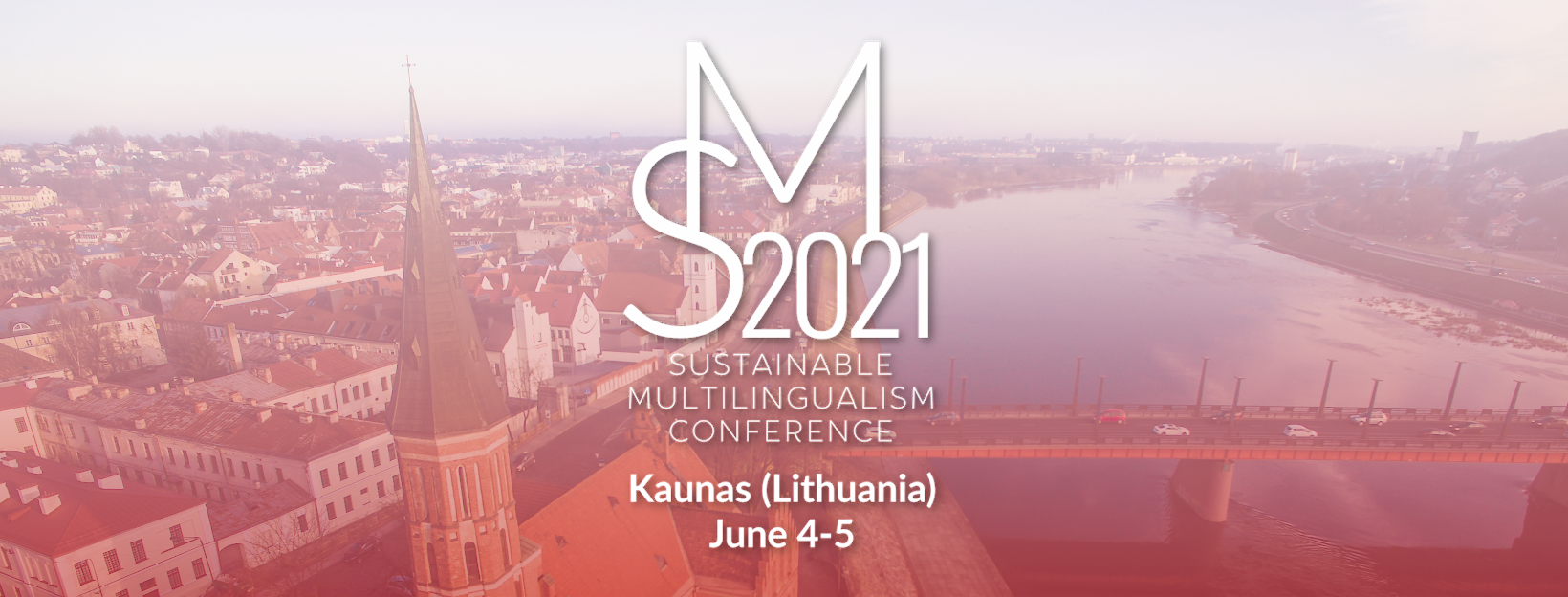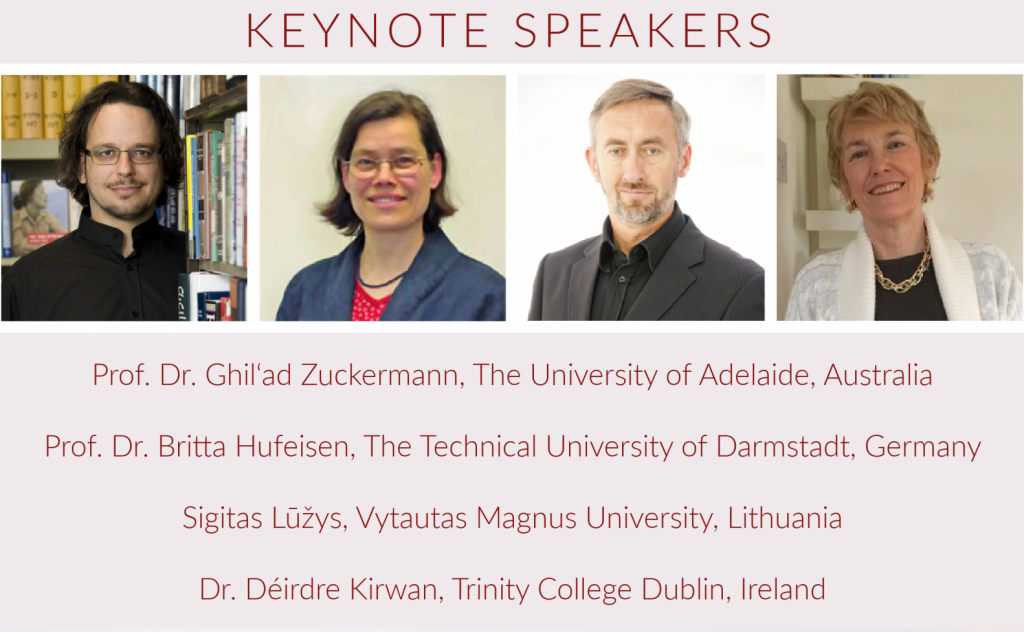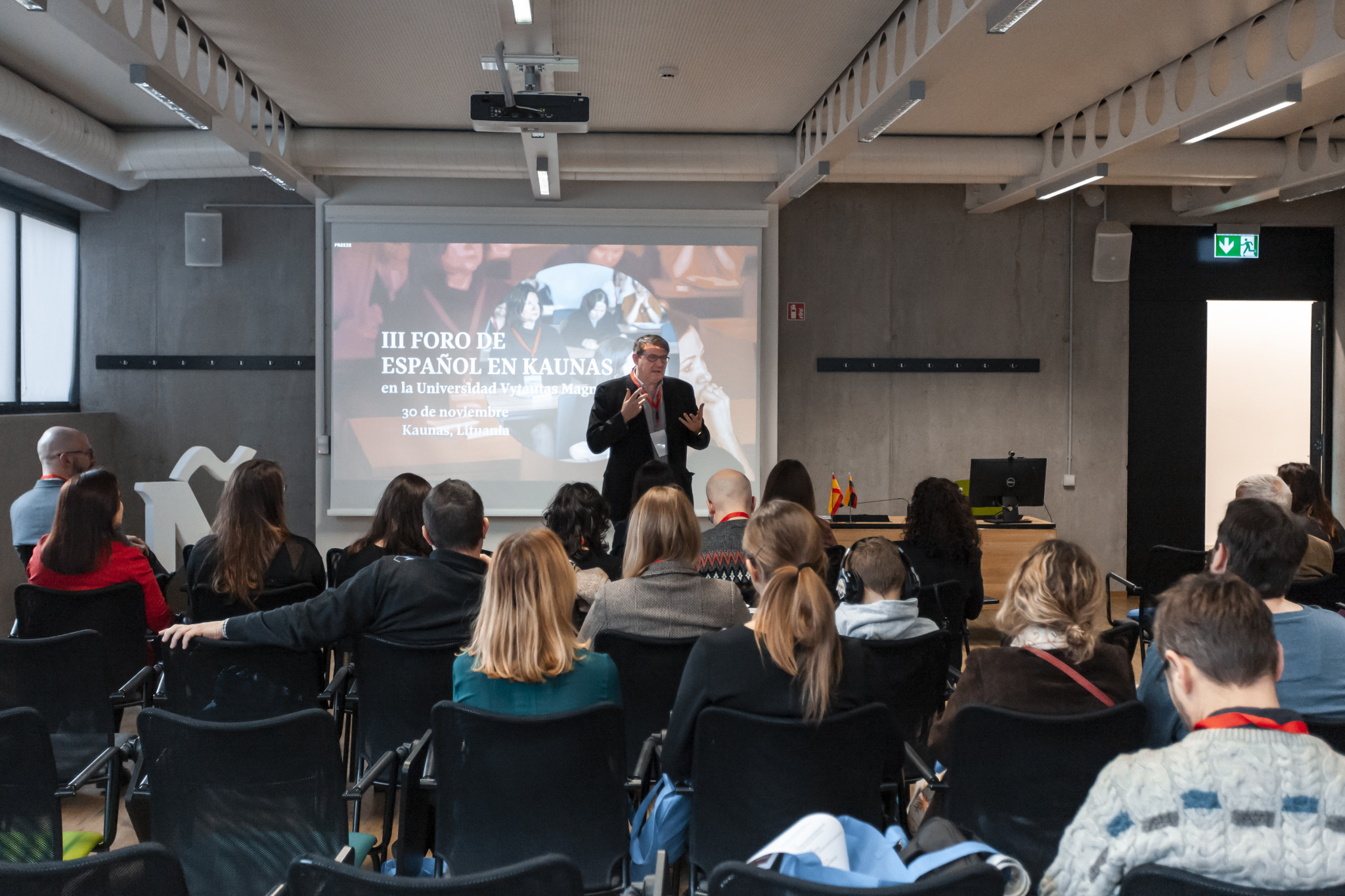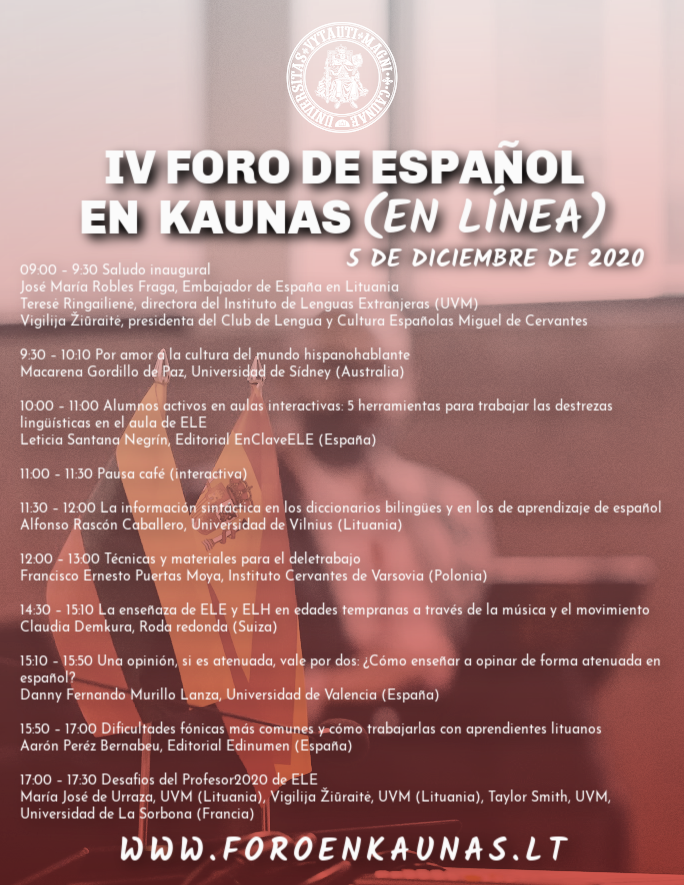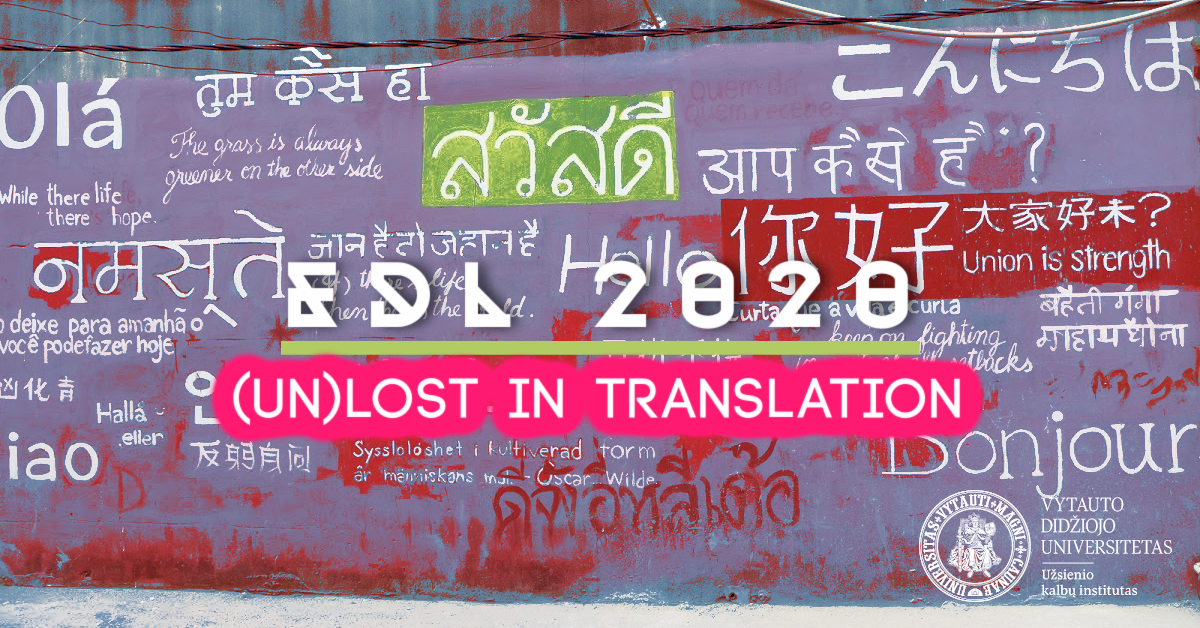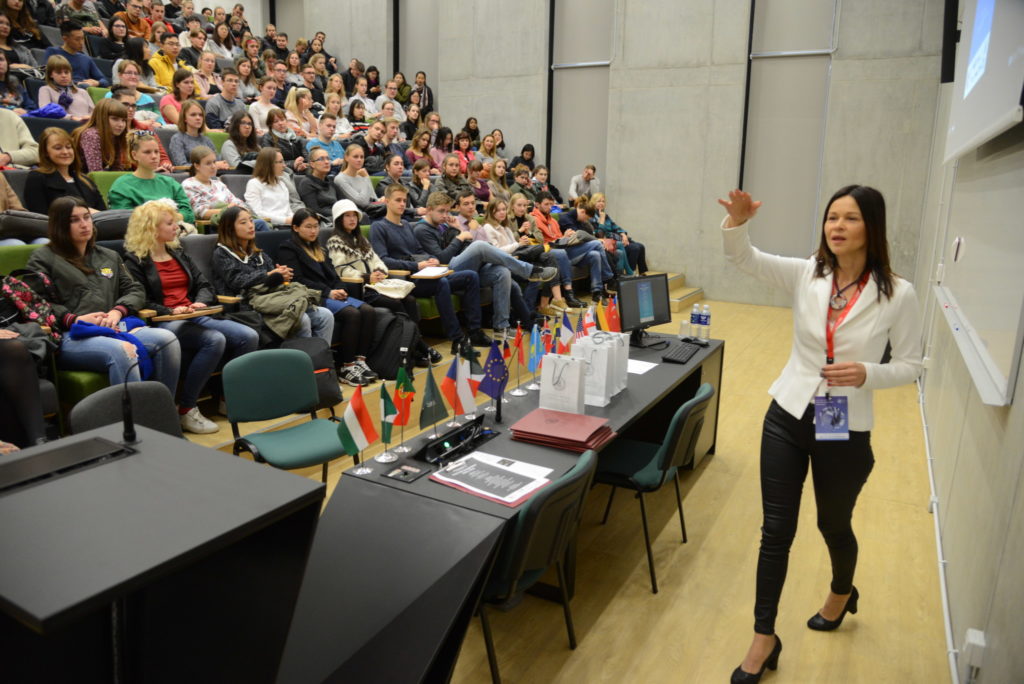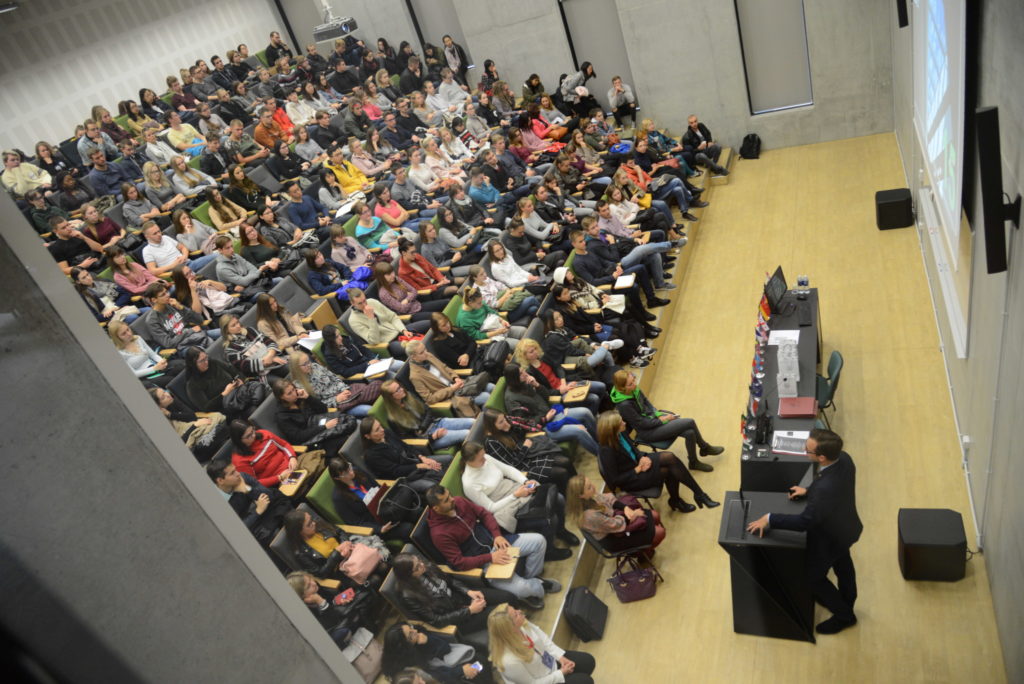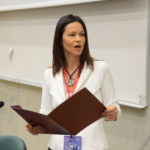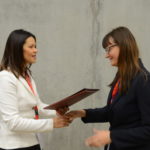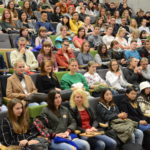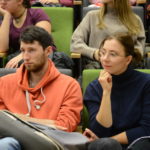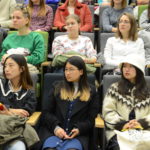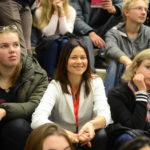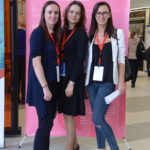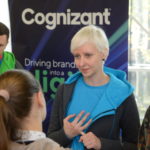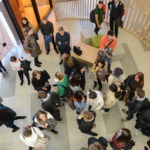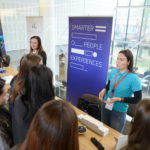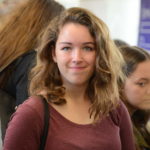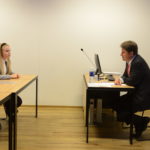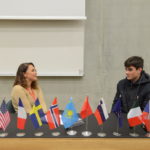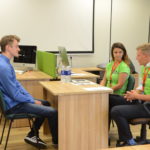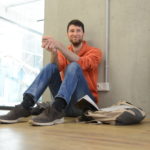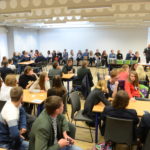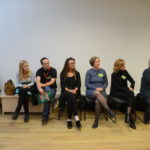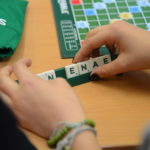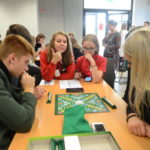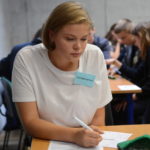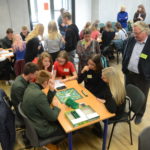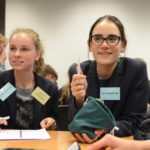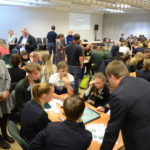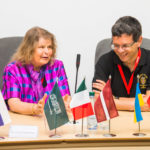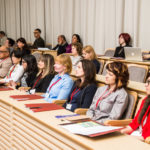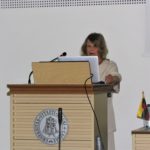Information for International Students
The spring semester 2021 is starting on February 1 online.
6th International Conference Sustainable Multilingualism 2021
The Institute of Foreign Languages of Vytautas Magnus University (VMU IFL), in cooperation with the Language Teachers’ Association of Lithuania, organizes the 6th International Scientific Conference “Sustainable Multilingualism” (Lith. Darnioji daugiakalbystė). The Conference will be held online on June 4-5, 2021. Abstracts are submitted by April 1.
The importance of Sustainable Multilingualism
“Sustainable multilingualism is the process of ensuring the harmonious coexistence of languages in a country, city or institution and human consciousness. It is the education of a multilingual person who, through learning the home language and other languages and his/her intercultural experience, develops and improves his/her general communicative competence. This competence allows improving mother tongue, communicating in several languages, understanding, comprehending the written or spoken text of other languages, and mediating with others who do not speak a common language. The future belongs to multilingual people who have general communicative competence in several languages and are able to use those languages flexibly,” says VMU IFL Prof. Dr. Nemira Mačianskienė, Chair of the Scientific Committee of “Sustainable Multilingualism”.
VMU IFL organized the first Conference dedicated to multilingualism in 2011. The aim was to contribute to the development of language policy in the country by providing a platform for researchers and language teaching practitioners to discuss the development of multilingualism, i.e. aspects of language preservation and language teaching and learning.
A Wide Range of Conference Themes
“Sustainable Multilingualism 2021” aims at bringing together researchers, language policymakers, language teaching professionals and students, and all the interested in the discussion on preserving and nurturing multilingualism. As the Conference will be held online this year, researchers from all over the world are invited to present their research and insights on the following topics (in English, Spanish, Italian, Latvian, Lithuanian, French, Russian and German):
- Language policy implementation (regional, national, institutional levels)
- Language preservation, revitalization, linguistic human rights
- Less widely spoken & taught languages
- Minority & regional languages
- Psycholinguistic perspectives of multilingualism
- Contemporary Lithuanian language studies
- Issues in translation and interpreting
- Virtual language teaching & learning
- Innovations in classroom language teaching and learning
- Plurilingual approach to language teaching & learning
- Linguistically sensitive teaching
- Content and Language Integrated Learning
- Intercultural communication in language teaching and learning
- Teaching and learning mediation competences
- Formative assessment
- Language teacher professional competence development
Keynote Speeches Will Be Delivered by World-Famous Scholars
The conference “Sustainable Multilingualism” always receives attention from world-famous scholars and multilingualism specialists. This year’s plenary speeches in English, German and Lithuanian will be given by Ghil’ Ad Zuckermann, Professor at the University of Adelaide (Australia), Britta Hufeisen from Darmstadt Technical University (Germany), Déirdre Kirwan from Trinity College Dublin (Ireland) and VMU IFL Latin Lecturer, Sigitas Lūžys, the winner of the Martynas Mažvydas Prize. The keynote speakers will present their latest research on the challenges of language teaching and learning as well as translation and the future of a multilingual world.
Submission of abstracts and registration takes place on the conference website.
Fourth Annual Spanish Language Forum at VMU to be Held Virtually
The Fourth Annual Spanish Language Forum in Kaunas (Foro de español en Kaunas) will take place on Saturday, December 5. This year’s international event will be organized remotely and will bring together over one hundred Spanish-language specialists from the Baltic region and other countries.
“For the fourth time, we aim to bring together Spanish language teachers, translators and other specialists to Vytautas Magnus University, where they can share innovative ideas, present research results, and discuss the latest language teaching methods. It is symbolic that this year, when we cannot meet physically, we have even greater opportunities to invite international professionals from all over the world. For example, Saturday’s plenary session will be given by Dr. Macarena Gordillo de Paz from the University of Sydney (Australia),” said Vigilija Žiūraitė, the organizer of the forum and a lecturer at the Institute of Foreign Languages.
The forum programme will include scientific reports, workshops and discussions. Seven guest lecturers from higher education institutions in Spain, Australia, Switzerland, Poland, France, and Lithuania will not only present the latest trends in Spanish language teaching and learning, translation, and other fields, but they will also invite participants to discuss the past year’s innovations in remote and distance learning.
This year’s IV Spanish Language Forum in Kaunas has received the exclusive attention of the Cervantes Institute (Instituto Cervantes)–whose representative from Warsaw, Dr. Francisco Ernesto Puertas Moya–will introduce the features of the official Spanish language test (DELE) to the forum participants.The Cervantes Institute is the state organization of the Kingdom of Spain, responsible for the teaching of Spanish and the dissemination of the culture of Spanish-speaking countries throughout the world.
The worldwide popularity of Spanish, which is the official language in 21 countries, is undeniable. According to the latest figures from the Cervantes Institute, 585 million people can speak Spanish fluently, and another 22 million are learning it as a foreign language. Spanish has been the most popular language among VMU students since the university was re-established in 1989, apart from the English language, which is compulsory. In 2011, on the initiative of VMU teachers and students, the Miguel de Cervantes Spanish Language and Culture Club was established, uniting fans of Spanish culture in Lithuania.
The forum will be held in Spanish. Pre-registration required.
European Day of Languages 2020
On September 25, the annual celebration of the European Day of Languages is returning to Vytautas Magnus University. This year, VMU Institute of Foreign Languages is inviting students and pupils to a fun multilingual competition “(Un)Lost in Translation,” which will take place in a virtual space.
The participants are suggested to test their language skills by trying to understand a multilingual text and translate it into Lithuanian. The team members will meet in virtual rooms, where they will have to listen to parts of the text told in English, German, French, Spanish, Italian and Russian and combine them into a coherent text in Lithuanian. The team that will manage not to get lost in translation and convey the content of the story as accurately as possible will win the competition.
In addition, various companies will share stories about situations related to “translation errors” and the need for language skills. The participants of the event will be able to communicate with the representatives of the companies and ask questions.
Programme of the event:
8:30-10:30 meeting with the representatives of the companies:
- The European Commission Representation in Lithuania
- “Kaunas In”
- UAB “Continental Automotive Lithuania”
- UAB “Alliance for recruitment”
- Travel agency “Janikės kelionės”
9:00-11:00 multilingual translation competition “(Un)Lost in Translation”
- Competition for VMU students and pupils
- Results and awards will be announced on Tuesday, September 28, on the website of the Institute of Foreign Languages http://uki.vdu.lt/. Presentation of prizes to the winners or their representative upon arrival at the Institute of Foreign Languages, address Gedimino Str. 44 (telephone number for inquiry +37037327845).
We are kindly inviting you to participate in the event, receive positive impressions and win valuable prizes: the prizes of VMU Institute of Foreign Languages are to study the chosen language free of charge; the prize of the European Commission Representation in Lithuania is coupons for books. In order to register for a meeting with companies, click on the link: Meeting with companies. Registration for the translation competition for student teams: Student registration for the competition.
MEETING WITH COMPANIES: PARTICIPATE
Information about COVID-19
In order to prevent the emergence of COVID-19 and its possible spread in Lithuania, VMU calls on its community to be public-spirited and socially responsible, to carry out all actions specified by the National Public Health Center under the Ministry of Health, and to keep up-to-date with information about the virus and its prevention.
Since the health of the community’s members is one of VMU’s top priorities, the studies during this autumn semester will be organized both remotely as well as in lecture rooms. The following changes have been approved: lectures of all A group subjects as well as lectures where the number of students is 100 or more will be held remotely. All other activities will take place in the university’s spaces, in accordance with safety recommendations. If 2-metre distance is not maintained between people in lecture rooms and other learning premises or during events in closed spaces, the participating adult individuals must wear personal protective equipment which covers their nose and mouth (face masks, respirators or other items).
Academic and non-academic staff will work in the university’s spaces until a different ruling is made by the government of Lithuania.
Please remember that events in closed spaces must be organised while upholding the principle of isolated groups, whereas in open spaces a distance of no less than 1 metre must be maintained between participants. If the weather conditions are favourable, events should be planned to take place in the open spaces of the university: the VMU Botanical Garden, courtyards of the faculties, territory of VMU Agriculture Academy etc.
I kindly ask everyone to be mindful of the situation and follow the recommendations that help us remain healthy and reduce the risk of coronavirus infection: maintain a safe physical distance during lectures and seminars, sit in every other seat, wear protective equipment covering nose and mouth (face masks, respirators or other items), wash hands regularly and, if you feel symptoms of cold or other infectious diseases, stay home.
Should you have any questions to IFL administration or your teacher, please first consider writing them an email in VMU outlook or talking on the phone. Only if your question cannot be tackled in a distance way, make an appointment and come to the IFL premises.
Meeting with representatives of Edulinker International Education & Technology, an educational agency in China
The Institute of Foreign Languages, the Centre for Asian Studies and the Career Centre invite you to a meeting with representatives of Edulinker International Education & Technology, an educational agency in China. You will be presented the opportunity for internship or work placement as a teacher of general education in China. Postgraduate students from a variety of specialities will be able not only to gain work experience, discover new multicultural country, but also to receive a monthly payment of 1,500-2,500 euros.
Place: K. Donelaitis st. 52 – 521
Time of the presentation: 10:00 – 10:45, 10 June
Personal consultations 10:45 – 12:00 and 13:00 – 16:00, 10 June
Meeting language: English
Lecturers: 翟清-Lucifer ir 白燕-Olivia
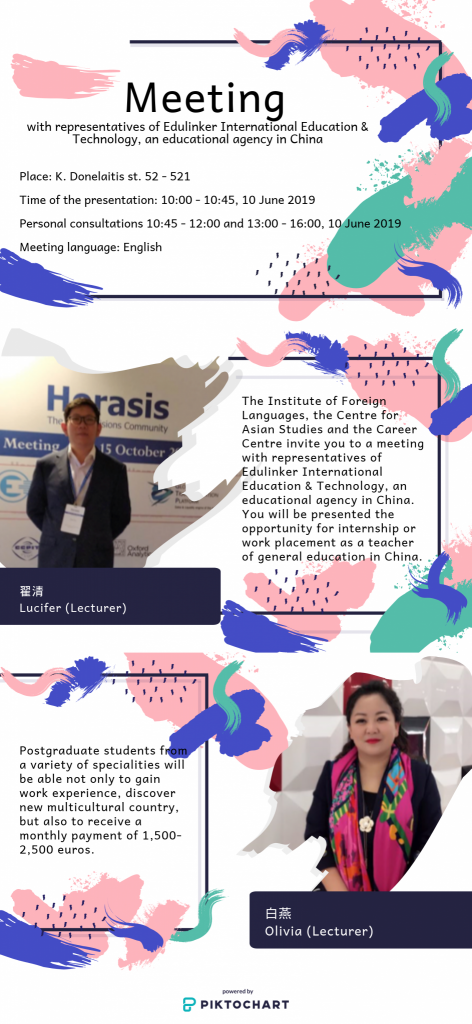
Sustainable Multilingualism 2019
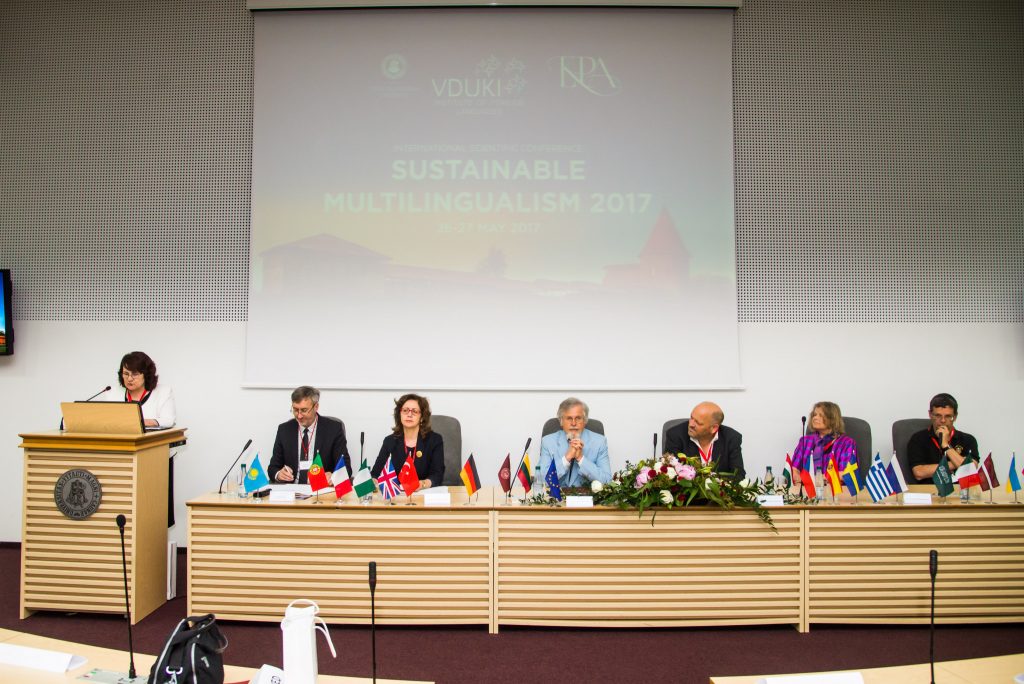
Institute of Foreign Languages (IFL) of Vytautas Magnus University in cooperation with Language Teachers’ Association of Lithuania (LKPA) are pleased to invite you to the 5th VMU IFL and the 13th LKPA international conference SUSTAINABLE MULTILINGUALISM 2019 24–25 May, 2019 Vytautas Magnus University, Kaunas, Lithuania.
The conference aims at bringing together scholars and language education professionals to share their research insights and discuss the issues relevant to the development of individual and societal multilingualism, including language policy, linguistic human rights, plurilingual pedagogy and language education in higher education.
For more information press the link.
Knowledge of languages opens all doors
It is a well-entrenched annual tradition of the Institute of Foreign Languages at Vytautas Magnus University to invite VMU and Kaunas community to celebrate the European Day of Languages. This year on the 27th of September the VMU Multifunctional Centre hosted two big events: a morning session tailored for VMU students to raise their awareness of foreign language demands in contemporary labour market and an afternoon session, a multilingual scrabble game, for High school students from all over Lithuania.
The morning session was opened by the director of the Institute of Foreign Languages assoc. prof. Vilma Bijeikienė who emphasised the vital importance of languages in today’s labour market and the need to be able to speak more than one. She compared foreign language competencies with breathing: as you can’t endure without fresh air, so can’t you survive without foreign language competences in our modern world especially in Lithuania. The plenary speech was delivered by Tadas Stankevičius, the head of Business Department of “Kaunas INN”, who presented multilingual perspectives of Kaunas city analysing the most recent tendencies in the investment sector and the demands for foreign languages.
The plenary was followed by meetings with the representatives from international companies. This year JSC “Hegelmann Transporte”, JSC Cocnizant Technology Solutions Lithuania, JSC “Intermedix Lithuania”, JSC KESKO Senukai Lithuania”, Lowyers’ professional union Magnusson & Co., JSC “Runway Lithuania”, JSC “Transcom Worldwide Vilnius” not only presented their companies and business activities in a fair format, but also offered students an opportunity to test their foreign language competences in job interview simulations in English, Danish, Norwegian, Russian and German.
The afternoon session hosted a multilingual scrabble game in English, French, German and Lithuanian organised by six institutions: European Commission, Geothe Institute, Institut français, British Council, the State Commission of the Lithuanian Language and VMU Institute of Foreign Languages. The game gathered 72 students and their teachers for an inspiring, entertaining and inventive multilingual adventure.
English Prep- Course
The Institute of Foreign Languages of Vytautas Magnus University provides students with an opportunity to improve their competences of general and academic English before or while starting their English medium study programmes.
General description of teaching English
Based on a communicative learner-centred approach, all courses develop learners’ reading, writing, speaking and listening skills, improve their use of grammar and phonetics as well as enrich their lexical repertoire at an indicated CEFR (Common European framework of reference) level. A variety of interactive teaching and learning forms are applied including group and peer work, making presentations, discussions and computer assisted language learning. Participants are also introduced to Lithuanian culture and contemporary lifestyle along with developing intercultural communication skills. Classes are delivered by experienced teachers of VMU Institute of Foreign Languages (IFL).
Intensive semester courses
Intensive semester courses aim at helping learners to advance their competence of English over two CEFR levels B1-B2 enabling them to further undertake their studies in English taught study programs. In addition to face-to-face classwork, learners of intensive semester courses are enrolled in virtual learning platforms.
Before enrolment into the course each participant has to take English placement test prepared by IFL. The result of the placement test serves to enlist participants in the groups corresponding to the level of their current competence.
Group size: 10-14 students
Duration: 13-15 weeks
Course volume:
• face-to-face classroom 180 hours
• teacher guided learning in virtual environment 15 hours
• teacher guided interactive learning in computer assisted language learning lab 30 hours
• individual work 255 hours
Number of credits 18 ECTS credits
Registration fee: 50 Eur (non-refundable)
Tuition fee:
• citizens of the EU countries — 37,90 Eur per 1 ECTS credit
• citizens of non-EU countries — 43,33 Eur per 1 ECTS credit
Registration deadline for 2018 Autumn semester: 30 August
Beginning of language classes: 3 September (later start is possible)
Our courses:
Activate your English A2-B1: intensive semester course
Activate your English B1-B2: intensive semester course
Application contacts
Regarding registration, accommodation and other general issues contact VMU International Cooperation Department at international@vdu.lt
For more information on programme content and delivery contact deputy director of VMU Institute of Foreign Languages Almantė Meškauskienė at almante.meskauskiene@vdu.lt
Sustainable Multilingualism 2017
Institute of Foreign Languages (IFL) of Vytautas Magnus University (VMU) successfully carries out its mission to provide efficient foreign language teaching, offering the broadest range of languages in Lithuania (currently 30 languages on offer), and also to perform research in plurilingual competence development and disseminating the scientific research internationally.
The 4th biennial international conference “Sustainable Multilingualism”, which was organized by IFL on 26-27 May 2017 (11th conference of the Lithuanian Language Teachers’ Association, with VMU as one of its founders) rallied over one hundred of researchers and language teaching professionals from over twenty countries of the world for discussion on individual plurilingualism and societal multilingualism in higher education. This year’s conference was exceptional in its focus on language preservation, linguistic human rights, minority language teaching and learning, challenges for culture and identity and continuing discussions on major issues in higher education language policy and language education in multilingual and multicultural learning space.
The conference was honored by world famous researchers and fighters for linguistic human rights – prof. ROBERT PHILLIPSON – the author of books on linguistic imperialism, challenges for language policy and language, who gave a plenary presentation “Linguistic challenges in global and regional integration” and prof. TOVE SKUTNABB-KANGAS – researcher into linguistic human rights, linguistic genocide and crimes against humanity in the education of Indigenous/ tribal/ minority/ minoritised children, linguicism (linguistically argued racism), mother-tongue-based multilingual education, linguistic imperialism and the subtractive spread of English, support for endangered languages, and the relationship between biodiversity and linguistic diversity. She gave a plenary presentation “Linguistic diversity, language rights and language ecology.”
President of the European Language Council / Conseil europeen pour les langues (CEL/ELC) MANUEL CÉLIO CONCEIÇÃO, professor of French linguistics at the University of Algarve, Portugal, researcher in language policy, intercultural communication, multilingualism in higher education, terminology and professional communication in the area of language studies and literature gave a plenary presentation “Higher Education Linguistic Landscape and Societal Challenges: Sustainable Perspectives for Real Evidences”. President of International Association of Multilingualism (IAM) and the General Editor of the International Journal of Bilingual Education and Bilingualism, JEAN-MARC DEWAELE, professor of Applied Linguistics and Multilingualism at Birkbeck College, University of London, United Kingdom, discussed the development of sociopragmatic and sociocultural competence as well as the effect of emotional acculturation to a new language and culture in his plenary speech “Communicating Emotions in a Foreign Language”.
Research findings on various topics were presented and discussed in parallel sessions: migration and language policy, bilingualism and multilingualism, issues in language policy in Ukraine, Hungary, Spain, Slovenia, Bangladesh and India; language education in multilingual and multicultural space in Lithuania, issues in minority language teaching/ learning and less wisely taught and spoken languages such as Valencian, Welsh, language of Hungarian minority in Ukraine, Lithuanian as a foreign language, use of Samogitian dialect for preservation of identity, hybridity and belonging to Greek Cypriot community in London. Language teacher education problems were also discussed by presenters from Trinidad and Tobago, Turkey, Sweden and Lithuania, as well as development of plurilingual competence in formal, non-formal and informal ways, issues of translation in multilingual environment. Problems of the use of various languages in literary texts were analyzed from a historical perspective, multilingualism in European literature, languages and literatures in Scotland were presented. Parallel sessions were held in Lithuanian, French, German and English languages.
127 registered participants – researchers and higher education language professionals – represented 24 countries of the world: Bangladesh, Belgium, Byelorussia, Bulgaria, the Czech Republic, Denmark, France, Germany, Hungary, India, Italy, Latvia, Lithuania, Kazakhstan, Poland, Russia, Slovenia, Spain, Sweden, Trinidad and Tobago, Turkey, Ukraine, United Arab Emirates, United Kingdom. 87 presentations were given during the two days of the conference: 60 oral, 12 virtual and 15 poster presentations.
The highest outcome of the conference, though, was expressed not in numbers but in the synergy which was sparked when the issue of multilingualism was viewed from different perspectives by presenters from various cultures, sharing their experience and ideas, attitudes and solutions to problems, expanding the networks of like-minded people, foreseeing common future research and projects. It is the joy of communication that is the highest value such events as international conferences can bring about.
MORE ABOUT CONFERENCE:
PHOTO COVERAGE
- Activate your English A1-A2: intensive semester course
- Activate your English A2-B1: intensive semester course
- Activate your English B1-B2: intensive semester course
- Alumni
- Conference
- Conferences
- Courses
- Home
- IFL Research Cluster
- İngilizce Hazırlık Kursu “English Prep-Course”
- Language learning
- News
- Research
- Scientific Journal “Sustainable Multilingualism”
- Students
- Подготовительный курс английского языка “English Prep-Course”
- About us
- Contacts


